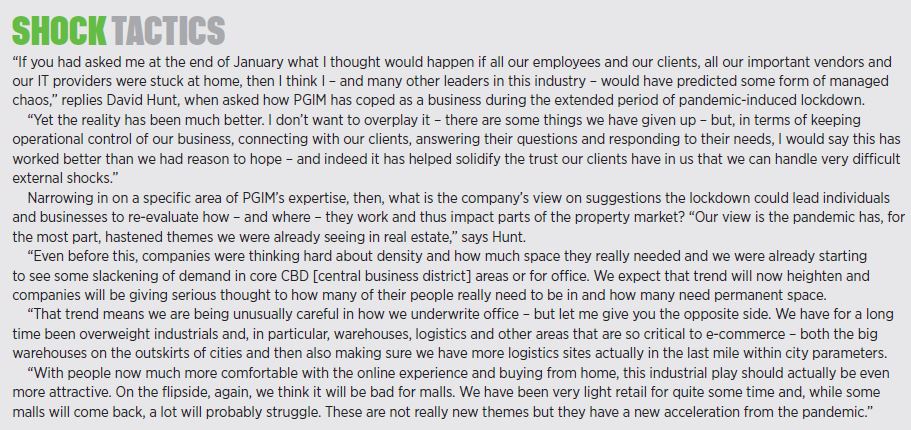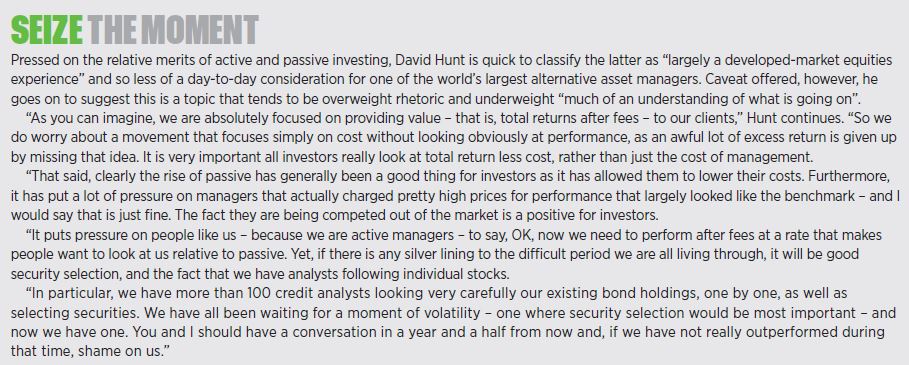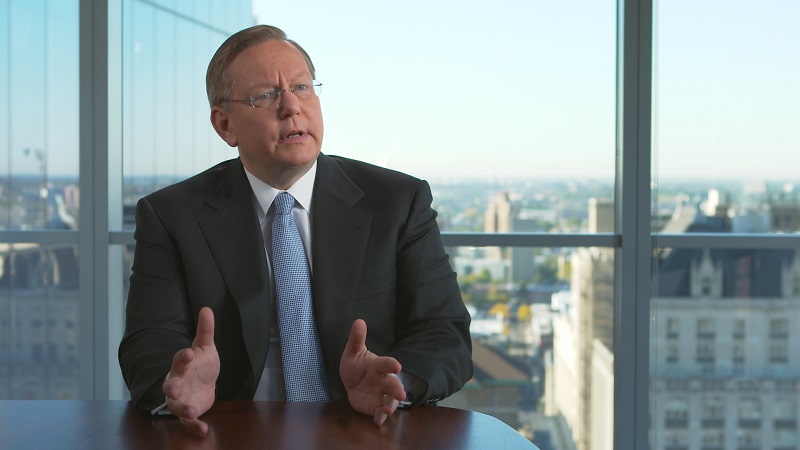From risk mitigation to product innovation, regulation to asset allocation, the global financial crisis ushered in a period of significant change for the asset management sector. For David Hunt, president and CEO of US investment giant PGIM, however, the most important change of the past decade concerns the role capital markets play in allocating capital around the world.
Hunt is well-placed to offer a global view on such matters having worked in Asia, France and the UK, as well as the US, in a career that saw him notch up 23 years at McKinsey & Co before, in 2011, taking the helm at PGIM, which runs some $1.3trn (£1.01trn) across both public and private asset classes. He also serves on the US Operating Council and the US Management Council for PGIM’s parent company Prudential Financial.
“It used to be that banks were very global and an awful lot of capital flowed through the UK clearing banks, the big US banks and the securities firms,” he begins. “You also saw a lot of foreign direct investment. Then, as globalisation began to be clamped down on after the financial crisis, you saw banks retreating to their own borders and a real fall in foreign direct investment.
“Now, with the pandemic, you have seen even more of a retreat. Add in the political motivations, which have been much more national – you see that with the US and obviously Brexit is a good example in the UK – and you effectively have the securities markets being the main way capital now moves around the world.
“As a result, I take my responsibility to make sure we are continuing to move capital into attractive new businesses, into emerging markets and right around the world even more seriously than before.
“If you think about the readers of Portfolio Adviser, it used to be possible for them to own a large group of large-cap stocks – and effectively they would have global exposure from that.
“That is becoming less and less true – there is no better example than the British banks – and you will now need to own many more foreign securities to achieve the same level of international exposure you would have had, say, before the crisis.
“The implication, then, is there is a much greater need for asset managers that can bring that kind of global scale and reach, which can help achieve the required diversification.”
A common vision of the future of asset management is of mid-sized players increasingly being squeezed as investors direct their money more towards global giants and/or specialist boutiques – but Hunt admits to growing less sure this is how things will pan out.
“I have long felt that barbell argument you just made is how things would go,” he says. “In the past few years, though – as we have had the big push in regulation in the major developed markets – I have begun to worry about the smaller players because I see them as a great engine of innovation. The large global players, who can invest in the necessary legal, compliance and technology systems, will have more and more of an upper hand in the new environment.”
To Hunt’s mind, it has never been more important for investors to have a global perspective. “When I meet with CIOs around the world, I rarely get questions about the best opportunity in the UK, say, or where to invest in the US. They want to know the best relative-value idea globally.
“So if you are a regionally based asset manager and you really only have perspectives from that, it is going to be increasingly hard for you to compete.”
Most asset management M&A is at the behest of the owners
That seems an appropriate point to touch on merger and acquisition activity in the asset management arena, which looked to be building up some momentum before the Covid-19 pandemic struck – and Hunt’s response is revealing.
“Over the past few years, you have seen global asset managers taking share from the others and I think that will continue to happen,” he says. “But people have been calling for consolidation in asset management forever and, while it does happen in bits, it never does so as fast as the investment bankers might dream – or would have you believe. Our own view on the reason for that is asset management is a profession – we exist to serve our clients and to put their interests first. In short, we are fiduciaries.
“We take our fiduciary duty very seriously and only engage in M&A when we believe our clients will benefit. Yet many of the mergers that do happen in asset management are at the behest of the owners because they want to cut costs and improve margins. Ask them why the merger is in the interest of their clients or why investment performance will improve and they would really struggle to answer.
“If you look at a lot of the large M&As around the world, it is not always clear why the clients are better off – indeed, sometimes even shareholders have shown their disappointment. Scale is definitely becoming more important and the world does need more large global players – but it needs to happen in a way that benefits not just shareholders but clients, too.”

What importance does Hunt attribute to corporate culture? “No question – culture is the ‘secret sauce’ to any true investment firm. An active manager’s investment culture has to focus on how to create an environment where you actually encourage people to take non-consensus views. Active managers do not get paid to invest as the market believes – you only create excess return if you have a non-consensus view.
“You also need a culture that will support people in their conviction if they are ‘wrong’ for reasonable periods of time – I am talking years – until the markets can turn. It is a rare culture indeed that does not get wound up in short-term performance, that actually supports meritocracy, and then supports teams that have real conviction and ideas that are not always popular.
“That is almost the antithesis of the culture of a large corporation where there is the need for consensus and also a lot of top-down decision making. Ours is bottom-up – everybody participates so it is a bit of a wrestling match intellectually in terms of ideas – and then there is that support I mentioned. That is what is so different about an investment culture than the approach of other businesses, even ones in banking or other financial services.”
The benefits of investing in private strategies
PGIM runs a so-called ‘multi-manager’ model, within which seven independent businesses focus on different asset classes and investment approaches, the three largest being PGIM Fixed Income ($868bn in public and alternative fixed income), PGIM Real Estate ($179bn in commercial real estate) and Jennison Associates ($155bn in fundamental equity and public fixed income).
Throw in the $91bn PGIM Private Capital runs in private debt and we can presumably take it as read Hunt believes investors should now be starting to think beyond equities, bonds and cash for a portion of their portfolios?
“One of the real conundrums we face as an industry is our large institutional clients have access to a very broad array of private strategies that have not been available to retail investors,” he says. “The diversification benefits – not to mention the raw returns – have been very attractive here and, in many cases, better than what you can get in the public markets.”
The example Hunt picks out is the US, where the number of publicly listed companies is less than half what it was at its mid-1990s peak – while, at the same time, there are trillions of dollars of what he describes as “unused powder” in the private equity markets.
“A challenge we have therefore been working hard on – and it is not an easy one – is how do you bring more of these strategies to the retail investor, knowing many of them by their nature are illiquid?” he continues. “There is nothing worse than putting illiquid securities in something and just hoping for the best – and then having retail investors be surprised when it does not work out well.”
Liquidity has certainly loomed larger in UK investors’ minds over the past 12 months, so what we can we learn from PGIM’s experience in alternative assets? How does the company work to reassure its real estate and private assets clients on the issue?
“We are quite conservative,” Hunt replies. “We would not offer some of the types of retail securities you do in the UK, partly because we do not believe they have the necessary liquidity.
“Real estate would be a good example here – and, to be honest, this is not the first time the UK has had problems with that asset class either, which suggests a failure to learn the lessons of the past. So I would say we do need to be cautious – though, having said that, there are ways of building liquidity and liquidity sleeves into a number of these funds.
“Yes, these can be a bit of a drag on performance – and we should be honest with clients about that – but they can also help provide the necessary redemption values for retail investors if they need it. So we are working hard, both in Europe and in the US, on these structures – and working with regulators to make sure they are as comfortable as we are as these are offered out to retail investors.”
Regulation stifles innovation
One lesson of the past decade Hunt believes the whole financial sector must absorb is that regulation can stifle innovation.
“In almost every industry where we have had more regulation, the large either remain large or get bigger, and the small have a really tough time with all the new rules,” he says. “Yet our industry has always thrived on small, innovative, interesting firms that have new ideas about how to invest. I am worried that in tomorrow’s world, with all the regulation involved, these innovative businesses simply won’t be at a size where they will be able to have the necessary compliance and legal functions to get up and running.
“For us, it is painful but possible; for small players – they are slowly being driving out of the market. I just worry that, in our urge for safety, we will lose a great deal in innovation.”

Finally, looking ahead a decade, what would be Hunt’s worst and best-case scenarios for the future of asset management?
“The worst case is somehow this return to national boundaries continues and we really see the flow of capital begin to dry up,” he says. “If we see a widening disparity between, say, Chinese and US spheres of influence and capital stops flowing as a result, we will see a lot of investment opportunities given up in that, and we will all be poorer as a society.
“That said, the important thing for PGIM will be to continue to deliver excess returns for our investors. I am not so worried about size or assets under management here – what concerns me is that excess return.
“And, in a strange sort of way, volatility and changes in pricing levels mean my confidence in an ability to generate that excess return actually goes up. So I am not one of those who thinks this is all bad news. There is bad news in there but our job is to allocate capital in a fair way after the market sets prices for risk and return.
“My best case for the industry, then, is we all continue to be able to do that effectively and globally.”











